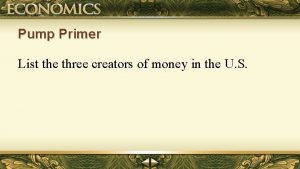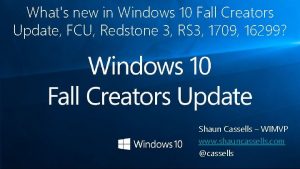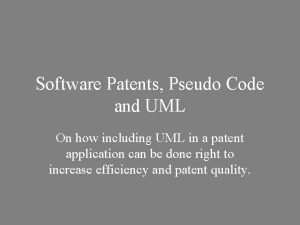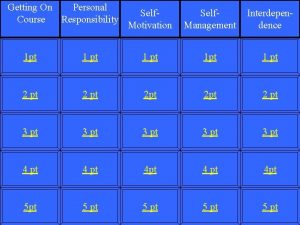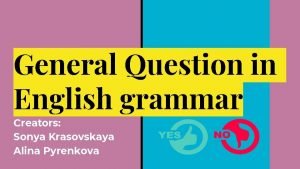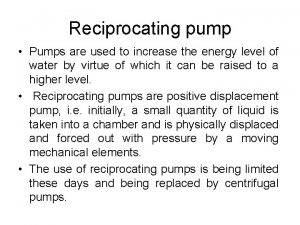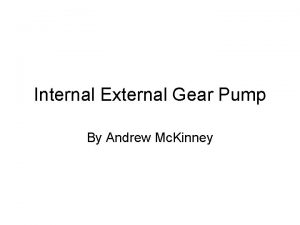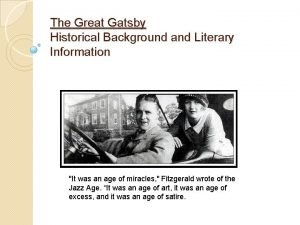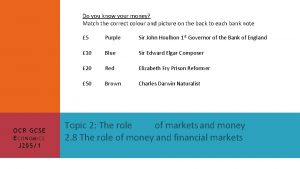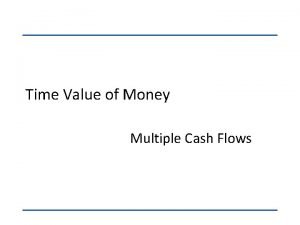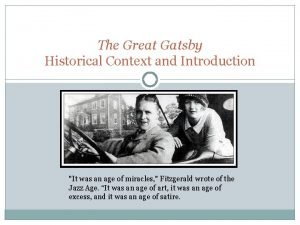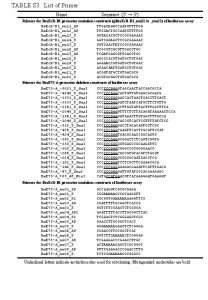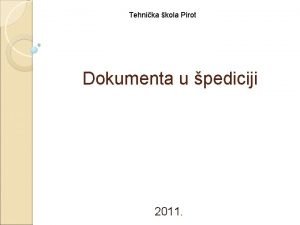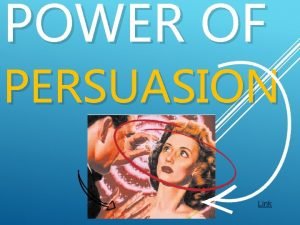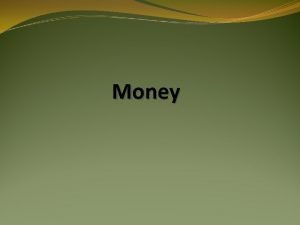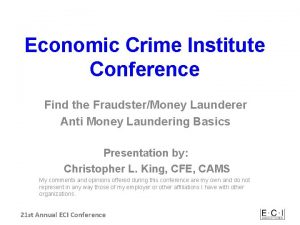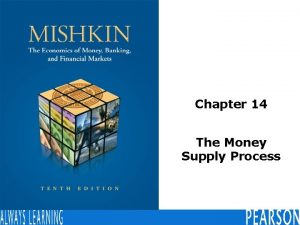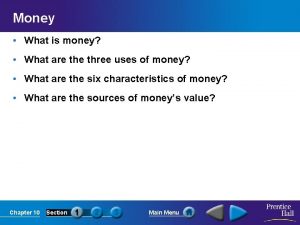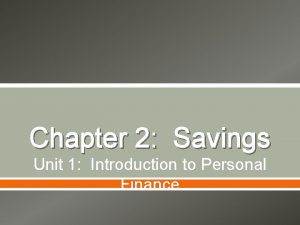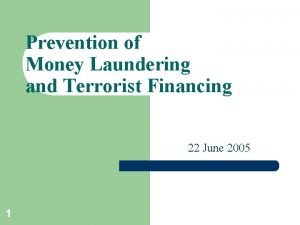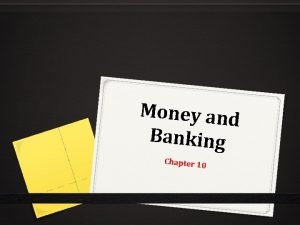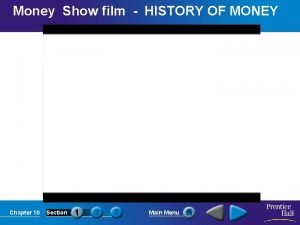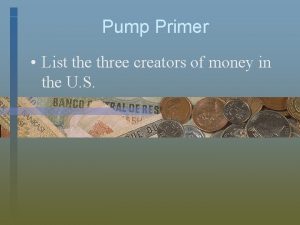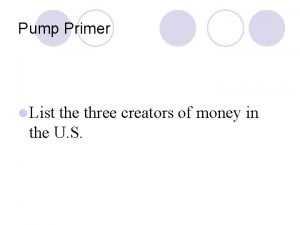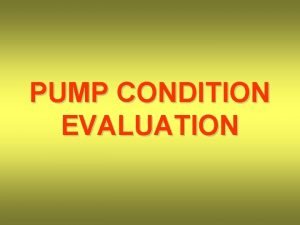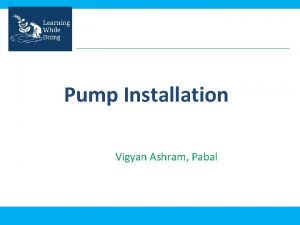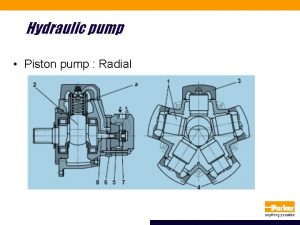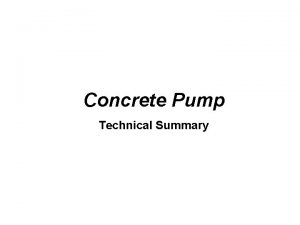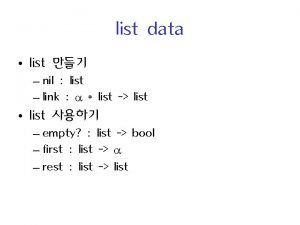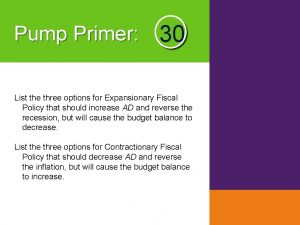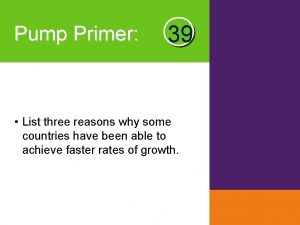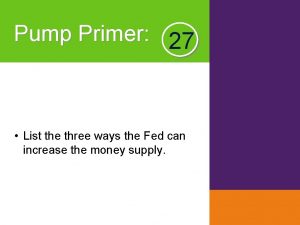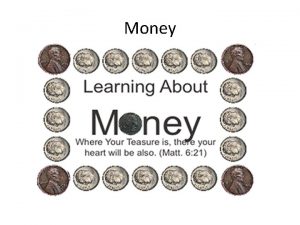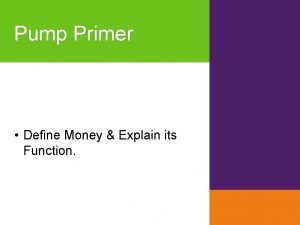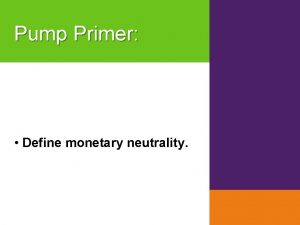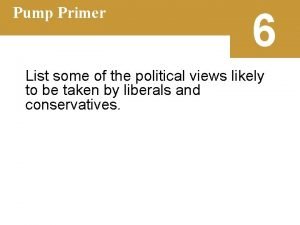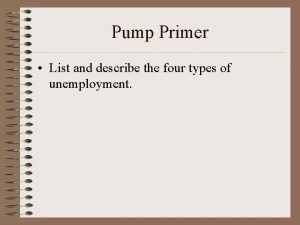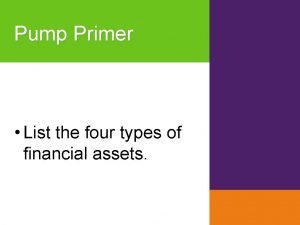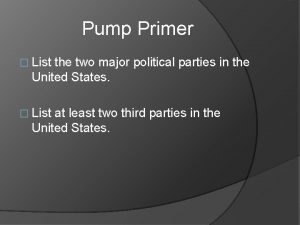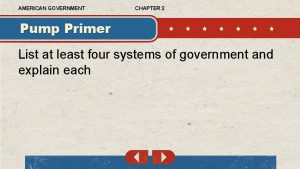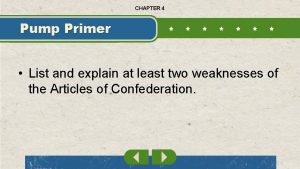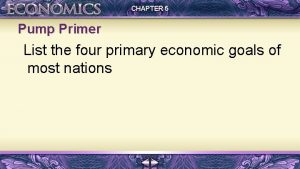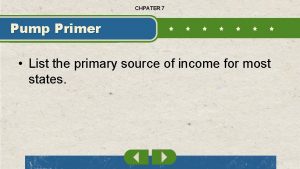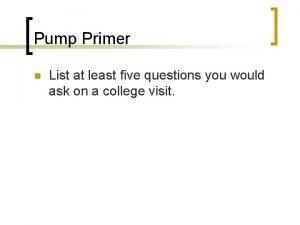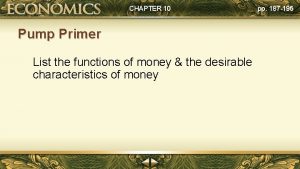Pump Primer List the three creators of money





















































![THE FEDERAL OPEN MARKET COMMITTEE [FOMC] • “The Fed’s chief body for monetary policymaking. THE FEDERAL OPEN MARKET COMMITTEE [FOMC] • “The Fed’s chief body for monetary policymaking.](https://slidetodoc.com/presentation_image_h/1321fe69353eeea90a02f3b05efe9414/image-54.jpg)












- Slides: 66

Pump Primer List the three creators of money in the U. S.

CHAPTER 11 Central Banking

CHAPTER 11 Objectives: • • List the three creators of money in the U. S. Explain why the Federal Reserve System was organized Describe the supervisory bodies of the Federal Reserve Explain the necessity of the Federal Reserve List and describe the functions of the Federal Reserve Describe the effects that change the discount rate Describe the effects of the open market operations has upon the money supply • Identify two reasons that the Fed attempts to control the supply of money • Explain the dangers of the Fed's actions to control the money supply

CHAPTER 11 Biblical Integration: • Seeing God's ownership of the world's wealth, His ability to distribute it as He sees fit, and His use of it to provide for the needs of His children.

CHAPTER 11 Who Creates Our Money? • United States Treasury • minting coins • Financial institutions • Federal Reserve Bank • the “central bank” pp. 210 -211

CHAPTER 11 Federal Reserve System • Functions: • oversees the issue of currency • regulates banking activity • provides banking services to commercial banks • controls the nation’s money supply pp. 211 -216

CHAPTER 11 pp. 211 -216 Federal Reserve System • Individual district banks • Twelve regional districts • Each district has one district bank • Each district bank has a board of directors

CHAPTER 11 p. 213

CHAPTER 11 pp. 211 -216 Federal Reserve System • Board of Governors • seven members • appointed by the President and confirmed by Congress • fourteen-year terms • set the reserve requirement

CHAPTER 11 pp. 211 -216 reserve requirement the percentage of deposits that banks must keep on hand

CHAPTER 11 pp. 211 -216 Federal Reserve System • Federal Open Market Committee (FOMC) • buy and sell government securities • changes the quantity of money in the money supply • twelve members

CHAPTER 11 Federal Reserve System • Independence • politically independent • financially independent • operationally independent pp. 211 -216

CHAPTER 11 Federal Reserve System • Checks on the Fed: • Congress may remove members • Congress could potentially abolish it pp. 211 -216

CHAPTER 11 pp. 217 -225 Functions of the Federal Reserve System • To provide a uniform and elastic currency • expand the money supply as the economy grows • Federal Reserve notes

CHAPTER 11 pp. 217 -225 Functions of the Federal Reserve System • To regulate member banks • To clear checks and debit card transactions • every check or debit card transaction

CHAPTER 11 pp. 217 -225 Functions of the Federal Reserve System • To act as the nation’s fiscal agent • holds the U. S. Treasury’s checking account • makes loans to the U. S. Treasury by having the FOMC purchase governmental bonds • supplies economic information and advice

CHAPTER 11 pp. 217 -225 Functions of the Federal Reserve System • To serve as the banker’s bank • lender of last resort • To create money • money multiplier effect

CHAPTER 11 pp. 217 -225 money multiplier effect the expansion of the money supply as a result of commercial banks’ lending their depositors’ money to others

CHAPTER 11 money multiplier 1 D × = increase in money supply rr D = initial deposit rr = reserve requirement pp. 217 -225

CHAPTER 11 pp. 217 -225 Money Multiplier • Poor tool for prediction • financial institutions do not lend all their excess reserves • not all recipients of loaned money will redeposit the entire amount

CHAPTER 11 Tools of Money Creation • Changing the discount rate • discounting: lending money to banks • discount rate • Changing the reserve requirement pp. 217 -225

CHAPTER 11 pp. 217 -225 Tools of Money Creation • Using open market operations • purchasing or selling governmental securities in the open market

CHAPTER 11 pp. 225 -228 monetary policy the increasing or decreasing of the money supply to influence the economy

CHAPTER 11 pp. 225 -228 Monetary Policy • A tight monetary policy reduces the money supply. • tends to curb inflation, but increases the risk of slower economic growth and higher unemployment

CHAPTER 11 pp. 225 -228 Monetary Policy • A loose monetary policy increases the money supply. • encourages economic growth and helps fend off recessions, but makes inflation more likely

CHAPTER 11 pp. 225 -228 The Money Supply and Prices • As more goods and services are produced, the money supply must increase to the same extent. • money supply grows more quickly inflation • money supply grows more slowly decline in prices, and possibly recession

CHAPTER 11 pp. 225 -228 The Money Supply and Interest Rates • The intersection of the demand supply curves for money determines the price of money (interest rate).

CHAPTER 11 p. 226

CHAPTER 11 p. 227

CHAPTER 11 pp. 225 -228 The Money Supply and Interest Rates • Fed increases money supply interest rate on loans decreases • • less costly for businesses to borrow stock market rises consumer financing becomes more affordable unemployment falls

CHAPTER 11 pp. 225 -228 The Fed Policy Tradeoff • Printing too much money could accelerate the economy too much. • “overheating”

CHAPTER 11 pp. 225 -228 The Fed Policy Tradeoff • To “cool down” an overheated economy, the Fed would decrease the growth rate of the money supply. • interest rates rise • businesses left with idle machines and employees

THE MULTIPLE EXPANSION OF CHECKABLE DEPOSITS • Part A Assumes that • The required reserve ration is 10 percent of checkable deposits and banks lend out the other 90 percent of their deposits (banks wish to hold no excess reserves) and • All money lent out by one bank is redeposited in another bank.

1. Under these assumptions, if a new checkable deposit of $1, 000 is made in Bank 1. (A) (B) (C) (D) (E) (F) How much will Bank 1 keep as required reserves? _______ $100 How much will Bank 1 lend out? _______ $900 How much will be redeposited in Bank 2? ____ $900 $90 How much will Bank 2 keep as required reserves? _______ How much will Bank 2 lend out? _______ $810 How much will be redeposited in Bank 3? ______

2. Use your answers to Question 1 to help you complete the table in Fig, 37. 1. Fill in the blanks in the table, rounding numbers to the second decimal (for example, $59. 059 = $59. 05). After you have completed the table, answer the questions that follow by filling in the blanks or underlining the correct answer in parentheses so each statement is true.

FIGURE 37. 1 CHECKABLE DEPOSITS, RESERVES AND LOANS IN SEVEN BANKS 1 $1, 000. 00 2 $100. 00 $900. 00 $90. 00 $81. 00 $729. 00 $656. 10 3 $810. 00 4 $729. 00 $72. 90 5 $656. 10 $65. 61 6 7 All other banks combined Total for all banks $590. 49 $59. 05 $531. 44 $53. 14 $478. 30 $4, 782. 98 $478. 29 $10, 000. 00 $1, 000. 00 $4, 304. 67 $9, 000. 00

3. IN THIS EXAMPLE: $1, 000. 00 (A) The original deposit of $1, 000 increased total bank reserves by _______. Eventually, this led to a total of $10, 000 expansion of bank deposits, $9, 000. 00 ____ of which was because of the original deposit, while ____ $1, 000. 00 was because of bank lending activities. (B) Therefore, if the fractional reserve had been 15% instead of 10%, the amount of deposit expansion would have been (more / less) than in this example. (C) Therefore, if the fractional reserve had been 5% instead of 10%, the amount of deposit expansion would have been (more / less) than in this example.

(D)If banks had not loaned out all of their excess reserves, the amount of deposit expansion would have been (more / less) than in this example. (E)If all loans had not been redeposited in the banking system, the amount of deposit expansion would have been (more / less) than in this example.

4. Another way to represent the multiple expansion of deposits is through T-accounts. In short, a T-account is an accounting relationship that looks at changes in balance sheet items. Since balance sheets must balance, so, too, must T-accounts. T-account entries on the asset side must be balanced by an offsetting asset or an offsetting liability. For the bank, assets include accounts at the federal Reserve District Bank, Treasury securities and loans; liabilities are deposits and net worth is assets minus liabilities. Show the $1, 000 checkable deposit described in Question 1 would be listed in a Taccount. Assets Loans Reserves Liabilities $900 $100 Deposits $1, 000

PART B • • • The Federal Reserve sets the reserve requirements: the percentages of the bank’s deposits that the bank must hold as reserves. Banks may not loan out these required reserves. As we said in Part A, this fractional reserve system actually allows banks to create money. The amount of reserves a bank holds is known as its total reserves. • • Total reserves are composed of required reserves, which the bank must keep, and excess reserves, which the bank can loan to other customers. The reserves held by the bank beyond those required by the /fed are excess reserves.

• • • How much money would be created if the bank continued to loan out its excess reserves to the last penny? To find out, we must calculate the deposit expansion multiplier. The deposit expansion multiplier determines how much money can be created in the economy from an initial deposit. The formula for the deposit expansion multiplier is Deposit expansion multiplier = 1 reserve requirement

• In the example in Part A, the Federal Reserve set the reserve requirement at 10%. So, the deposit expansion multiplier would be: Deposit expansion multiplier = 1 0. 10 = 10 • To find the maximum amount of money that could be created, the formula is: Expansion of the money supply = deposit expansion multiplier x excess reserves

• The multiplier is 10, and excess reserves from the initial bank deposit are $900. So the potential expansion of money (M 1) would be: Expansion of the money supply = 10 x $900 = $9, 000 M 1 now consists of the original $1, 000 deposit plus the $9, 000 created.

Part B 5. Assume that $1, 000 is deposited in the bank, and that each bank loans out all of its excess reserves. For each of the following required reserve ratios, calculate the amount that the bank must hold in required reserves, the amount that will be excess reserves, the deposit expansion multiplier and the maximum amount that the money supply could increase.

Required Reserve Ratio 1% 5% 10% Required reserves $10 $50 Excess reserves $990 Deposit expansion multiplier 100 12. 5% 15% 25% $100 $125 $150 $250 $900 $875 $850 $750 20 10 4 8 6. 67 Maximum increase in the money supply $99, 000 $19, 000 $9, 000 $7, 000 $5, 669. 50 $3, 000

6. If the required reserve ratio were 0 percent, then money supply expansion would be infinite. Why don’t we want an infinite growth of the money supply? We would have hyperinflation.

7. If the Federal Reserve wants to increase the money supply, should it raise or lower the reserve requirement? Why? The Federal Reserve should lower the required reserve ratio. Banks would have more excess reserves to lend out and, thus, the money supply could increase.

8. What would happen if the Federal Reserve increases the reserve requirement? If the Federal Reserve increase reserve requirements, the money supply will decrease.

9. What economic goal might the Federal Reserve try to meet by reducing the money supply? Price Stability

10. Why might the money supply not expand by the amount predicted by the deposit expansion multiplier? Several reasons: (1) All money may not be deposited into the banking system (2) The banks may not be able to lend out all excess reserves because people do not want to borrow (3) Banks may want to keep excess reserves as a precaution.

THE FEDERAL RESERVE SYSTEM AND ITS TOOLS Unit 4 Lesson 4 Activity 38 Graboyes, Rover. University of Richmond. Advanced Placement Economics Teacher Resource Manual. National Council on Economic Education, New York, N. Y

OBJECTIVES • Describe the structure of the Federal Reserve System • Identify each of the tolls of the Fed and explain • Explain basic balance sheets

INTRODUCTION • The focus of this lesson is the Federal Reserve System; how its actions relate to the money creation process and how its tools affect the money supply. • The Federal Reserve System is the central bank for the United States created in 1913. • It has regulatory authority for many financial institutions that hold checkable deposits. • It has the responsibility to control the money supply to promote the economic goals of full employment, price stability and stable economic growth.
![THE FEDERAL OPEN MARKET COMMITTEE FOMC The Feds chief body for monetary policymaking THE FEDERAL OPEN MARKET COMMITTEE [FOMC] • “The Fed’s chief body for monetary policymaking.](https://slidetodoc.com/presentation_image_h/1321fe69353eeea90a02f3b05efe9414/image-54.jpg)
THE FEDERAL OPEN MARKET COMMITTEE [FOMC] • “The Fed’s chief body for monetary policymaking. • The FOMC’s decisions ultimately affect interest rates. • The FOMC meets in Washington, usually eight times a year. ” (Emery)

• “Changes in the federal funds rate trigger a chain of events that affect other short-term interest rates, foreign exchange rates, long-term interest rates, the amount of money and credit, and, ultimately, a range of economic variables, including employment, output, and prices of goods and services. ” (“Federal Reserve Board”)

• Primary Responsibility: • “Among the Fed's duties are managing the growth of the money supply, providing liquidity in times of crisis, and ensuring the integrity of the financial system. • The FOMC's decisions to change the growth of the nation's money supply affect the availability of credit and the level of interest rates that businesses and consumers pay. • Those changes in money supply and interest rates, in turn, influence the nation's economic growth and employment in the short run and the general level of prices in the long run. ” (“Federal Reserve Board”)

THE MECHANICS OF MONETARY POLICY • • To manage the money supply, the Federal Reserve uses the tools of monetary policy to influence the quantity of reserves in the banking system. Increasing (decreasing) reserves tend to expand (contract) a bank’s ability to make loans. • Thus, reserve management gives the Fed powerful influences over the money supply and, in turn, over the general price level.

BALANCE SHEETS • “The Federal Reserve operates with a sizable balance sheet that includes a large number of distinct assets and liabilities. Left side of a balance sheet shows the assets, and the right side shows the liabilities. ” • • Net worth = assets - liabilities Liabilities: • • • Treasury Securities Federal Reserve notes (U. S. paper currency) and the deposits that thousands of depository institutions, the U. S. Treasury, and others hold in accounts at the Federal Reserve Banks. Assets: • holdings of Treasury, agency, mortgage-backed securities; discount window lending; lending to other institutions; foreign currency (“Federal Reserve Board”)

ACTIVITY 38 • For Questions 1 thru 4 start with the baseline case in Fig. 38. 1. The Fed wishes to decrease the money supply from $353 to $303 by market operations. The reserve requirement is 10%. 1. Will the Fed want to buy or sell existing Sell Treasury securities? _______ 10 2. What is the money multiplier? ______ (1/0. 10 = 10) 3. What is the value of Treasury securities that (50/10 = 5) need to be bought or sold? _______

FOR Q 5 THRU 7, SUPPOSE BANKS KEEP ZERO EXCESS RESERVE AND THE RESERVE REQUIREMENT IS 15%. 5. What is the deposit expansion multiplier? (1/0. 15 = 6. 67) _______ 6. A customer deposits $100, 000 in his checking account. A. How much of this can the bank lend to new customers? 85% of 100, 000 = $85, 000 __________ B. How much must the bank add to its reserves? 15% of 100, 000 = $15, 000 __________ C. In what two forms can a bank hold the new required reserves? Vault cash or in the reserve account (Fed Res. )

7. Suppose that the $100, 000 had previously been held in Federal Reserve notes under the customer’s mattress and that banks continue to hold no excess reserves. By how much will the customer’s deposit cause the money supply to $85, 000 x 6. 67 = $566, 950 grow? ___________ 8. A very low discount rate may (encourage / discourage) banks from borrowing from the federal Reserve. Underline the correct answer and explain why. Banks borrow at a low interest rate, this will create more of a profit

9. The federal funds rate is the interest rate at which financial institutions can borrow from other financial institutions. Suppose the federal funds rate is 5% and the discount rate is 4. 5 percent. Why is it that a bank might choose to borrow in the federal funds market, rather than getting the lower interest rate available through the discount window? Fewer transaction costs and less scrutiny from the Federal Reserve will generate.

10. In a foreign country, the reserve requirement is 100%. What will be the deposit expansion multiplier? ______ (1/1 = 1) 11. If the fed decided to implement a policy action designed to increase the money supply in which direction would bank reserves and the federal funds rate change and why? Institute a policy to increase reserves (giving banks an increased ability to make loans). Banks have more money to loan to other banks, businesses and consumers, so the federal funds rate is likely to decrease.

12. CIRCLE THE CORRECT SYMBOL (↑ FOR INCREASE, ↓ FOR DECREASE) Federal Reserve action Bank Reserves Money Supply Fed Funds Rate A. Sold Treasury securities on the open market B. Bought Treasury securities on the open market C. Raised the discount rate D Lowered the discount rate E. Raised the reserve requirement F. Lowered the reserve requirement

13. INDICATE IN THE TABLE IN FIG. 38. 5 HOW THE FEDERAL RESERVE COULD USE EACH OF THE THREE MONETARY POLICY TOLLS TO PURSUE AN EXPANSIONARY POLICY AND A CONTRACTIONARY POLICY. Fig. 38. 5 Tools of Monetary Policy A. Open market operations B. Discount rate C. Reserve requirements Expansionary Policy Contractionary Policy Buy Treasury securities Sell Treasury securities Lower discount rate Raise discount rate Lower required reserve ratio Raiser required reserve ratio

INFORMATION TO KNOW! FDIC: Five member – Board of Directors Federal Reserve Bank: Seven member – Board of Governors Twelve Districts: (each) Nine member Board of Directors FOMC: Twelve member committee: • Fed Board of Governors (seven members) • President of the Federal Reserve Bank of N. Y. • Four other Federal Reserve Presidents (serving a one-year term)
 Who are the three creators of money in the united states
Who are the three creators of money in the united states Dana damian
Dana damian Fall creators update whats new
Fall creators update whats new Uml creators
Uml creators Creators spend as much time as possible in quadrant
Creators spend as much time as possible in quadrant John was busy yesterday evening
John was busy yesterday evening Classification of reciprocating pump
Classification of reciprocating pump Internal vs external gear pump
Internal vs external gear pump Screw pump vs gear pump
Screw pump vs gear pump Symbolism in great gatsby
Symbolism in great gatsby Money smart money match
Money smart money match Money on money multiple
Money on money multiple Gatsby historical background
Gatsby historical background How is daisy described in the great gatsby
How is daisy described in the great gatsby Primer name list
Primer name list Primer name list
Primer name list Tovarni list primer
Tovarni list primer She wanted three things money power and
She wanted three things money power and Name one of the three functions of money
Name one of the three functions of money The stages of money laundering
The stages of money laundering Three players in the money supply process
Three players in the money supply process What are the three uses of money
What are the three uses of money Section 2 three basic reasons to save money
Section 2 three basic reasons to save money Money laundering stages
Money laundering stages 3 uses of money
3 uses of money The three uses of money
The three uses of money What is money multiplier formula
What is money multiplier formula Hát kết hợp bộ gõ cơ thể
Hát kết hợp bộ gõ cơ thể Frameset trong html5
Frameset trong html5 Bổ thể
Bổ thể Tỉ lệ cơ thể trẻ em
Tỉ lệ cơ thể trẻ em Chó sói
Chó sói Tư thế worm breton
Tư thế worm breton Alleluia hat len nguoi oi
Alleluia hat len nguoi oi Môn thể thao bắt đầu bằng từ chạy
Môn thể thao bắt đầu bằng từ chạy Thế nào là hệ số cao nhất
Thế nào là hệ số cao nhất Các châu lục và đại dương trên thế giới
Các châu lục và đại dương trên thế giới Công thức tính thế năng
Công thức tính thế năng Trời xanh đây là của chúng ta thể thơ
Trời xanh đây là của chúng ta thể thơ Mật thư anh em như thể tay chân
Mật thư anh em như thể tay chân 101012 bằng
101012 bằng độ dài liên kết
độ dài liên kết Các châu lục và đại dương trên thế giới
Các châu lục và đại dương trên thế giới Thể thơ truyền thống
Thể thơ truyền thống Quá trình desamine hóa có thể tạo ra
Quá trình desamine hóa có thể tạo ra Một số thể thơ truyền thống
Một số thể thơ truyền thống Bàn tay mà dây bẩn
Bàn tay mà dây bẩn Vẽ hình chiếu vuông góc của vật thể sau
Vẽ hình chiếu vuông góc của vật thể sau Nguyên nhân của sự mỏi cơ sinh 8
Nguyên nhân của sự mỏi cơ sinh 8 đặc điểm cơ thể của người tối cổ
đặc điểm cơ thể của người tối cổ V cc
V cc Vẽ hình chiếu đứng bằng cạnh của vật thể
Vẽ hình chiếu đứng bằng cạnh của vật thể Tia chieu sa te
Tia chieu sa te Thẻ vin
Thẻ vin đại từ thay thế
đại từ thay thế điện thế nghỉ
điện thế nghỉ Tư thế ngồi viết
Tư thế ngồi viết Diễn thế sinh thái là
Diễn thế sinh thái là Các loại đột biến cấu trúc nhiễm sắc thể
Các loại đột biến cấu trúc nhiễm sắc thể Bảng số nguyên tố
Bảng số nguyên tố Tư thế ngồi viết
Tư thế ngồi viết Lời thề hippocrates
Lời thề hippocrates Thiếu nhi thế giới liên hoan
Thiếu nhi thế giới liên hoan ưu thế lai là gì
ưu thế lai là gì Hổ đẻ mỗi lứa mấy con
Hổ đẻ mỗi lứa mấy con Sự nuôi và dạy con của hổ
Sự nuôi và dạy con của hổ Sơ đồ cơ thể người
Sơ đồ cơ thể người
